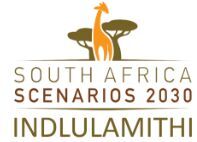The 5th annual Indlulamithi Day will explore South Africa’s 2030 trajectory and state of social compacting
Written by: Khutso Makofane Save to Instapaper
Johannesburg, South Africa – 21 July 2021 – How have events from the last 12 months – including the July 2021 unrest, loadshedding and KwaZulu-Natal floods – affected South Africa’s 2030 outlook and prospects for social compacting? These are key questions that the 5th annual Indlulamithi Day, taking place on 27 July, will answer. The event, hosted by the Indlulamithi Scenarios Trust, will share the latest results of the 2022 Indlulamithi Barometer and host a Social Compact Seminar in collaboration with the GIBS Centre for Leadership and Dialogue.
Indlulamithi Day is an annual event held to reflect on South Africa’s current condition, trajectory and progress towards social cohesion. The discussions are based around the Indlulamithi Scenarios that were launched in 2018.
The highlight of the event is seeing which of the three Indlulamithi Scenarios is South Africa most tracking towards by releasing the latest results of the Indlulamithi Barometer.
The 2022 barometer results will consider key happenings and trends from June 2021 to May 2022 – including the July 2021 unrest, the KwaZulu-Natal flooding, loadshedding, and the effects of the COVID-19 pandemic – and their impact on leadership and institutional capacity, social inequality, and lingering issues of resistance, resentment and reconciliation that shape South Africa’s trajectory.
Unlike previous annual events, the 5th Indlulamithi Day will include a solutions-driven component - the Social Compacting Seminar that will focus on the possibilities of co-creating and framing what a new approach to social compacting might look like for South Africa, focusing on three key questions:
What is the state and future of South Africa social compact(s)?What are the options, or impediments and processes for compacting?What framework or approach for compacting can work for South Africa, with who doing what, and when?
Speaking about this year’s event, Xolelwa Kashe-Katiya, acting Project Leader, says: “Despite great progress over the last two decades, South Africa still battles crises of inadequate economic growth, unemployment, sharp inequalities, low levels of fixed investment and frail social capital. Without greater alignment between the social partners, without certainty about South Africa’s policy direction, and without clarity about the role of each partner in South Africa’s post-COVID-19 recovery, national progress will remain elusive. As Indlulamithi, we are on a quest to change this – using scenarios tracking to establish a shared picture of the country’s trajectory and a shared sense of urgency and ownership to collectively create the future.”
Last year, the Indlulamithi Barometer results showed that the country was 59% trending towards Gwara Gwara, the worst-case scenario that envisions South Africa as a demoralised land of disorder and decay. In this scenario, levels of social cohesion are low, average economic growth drops below 2%, official unemployment never falls below 25%, and approximately one third of the population remains in poverty. The Indlulamithi barometer uses 53 indicators, compiled from published datasets and organised into three key driving forces, to measure the extent to which the different scenarios are materialising over time. The barometer was launched by Chief Justice Mogoeng Mogoeng in 2019 and continues to be updated annually on Indlulamithi Day to account for recent events and trends.
Dr Tara Polzer Ngwato, lead researcher for the Indlulamithi Barometer, adds: “The right kind of information leads to the right kind of action. If we don’t have a shared picture of where the country currently is and where it’s going, it becomes a lot harder to have compacting conversations because you get contestations across sectoral priorities and interpretations of reality, and a lower sense of shared purpose. We then tend to act in siloes and have a decision-making narrative that is fragmented or one that leaves components of society behind. What we’re doing with the Indlulamithi barometer is trying to bring a range of things together into the right kind of medium to allow good decision making.”
This year’s event will include a dialogue exploring alternative approaches to social compacting and building social compacts, top-down and bottom-up. The discussion will be led by Dr Marius Oosthuizen (Faculty & Director, Leadership & Dialogue: Gordon Institute of Business Science), with contributions from Phindile Baleni (DPME), Adam Kahane (Author: Collaborating with the Enemy), Andrew Boraine (EDP), Nishan Bolton (Ahmed Kathrada Foundation?) and Lisa Seftel (NEDLAC).
Keynote speakers at previous Indlulamithi Day events have included President Cyril Ramaphosa, Chief Justice Mogoeng Mogoeng, Speaker of the National Assembly Thandi Modise, and Former President Kgalema Motlanthe.
The event will be free for the public to join online and those interested can register at https://zoom.us/meeting/register/tJModeGqrjwpHt1KhWjUOgPG5POQVe1LKKDl.
For PR and Media Enquiries, please contact:Funie RabambiTwenty8Zero7 Communications+27 71 252 0027This email address is being protected from spambots. You need JavaScript enabled to view it.
Get new press articles by email
The Pulse Latest Articles
- Education Is The Frontline Of Inequality, Business Must Show Up (December 11, 2025)
- When The Purple Profile Pictures Fade, The Real Work Begins (December 11, 2025)
- Dear Santa, Please Skip The Socks This Year (December 10, 2025)
- Brandtech+ Has 100 Global Creative Roles For South African Talent (December 9, 2025)
- The Woman Behind Bertie: Michelle’s Journey To Cape Town’s Beloved Mobile Café (December 9, 2025)
